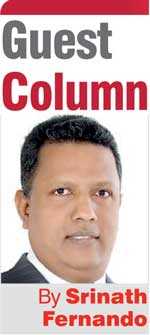Tuesday Feb 24, 2026
Tuesday Feb 24, 2026
Saturday, 4 July 2020 00:10 - - {{hitsCtrl.values.hits}}

American Independence Day is marked on 4 July
 Americans celebrate their independence on 4 July every year on a much grander scale and this has been in vogue since 4 July 1776, culminating in the adoption of the Declaration of Independence in Philadelphia Pennsylvania. The Declaration coincided with the joining of 13 States which were at war with the Kingdom of Great Britain regarded themselves as thirteen independent sovereign states and pledged themselves that they were no longer under British rule.
Americans celebrate their independence on 4 July every year on a much grander scale and this has been in vogue since 4 July 1776, culminating in the adoption of the Declaration of Independence in Philadelphia Pennsylvania. The Declaration coincided with the joining of 13 States which were at war with the Kingdom of Great Britain regarded themselves as thirteen independent sovereign states and pledged themselves that they were no longer under British rule.
The United States Constitution is a Federal Constitution consists of 50 states with their own State Constitutions. The President of the United States is the Head of the Executive Branch of the American Government. The Legislature consists of two Chambers of Congress, the Senate and the House of Representatives.
There is a strict separation of powers under the US Constitution where the Cabinet of Ministers are picked directly from the ordinary people – of course with a good track record in the society – unlike in Sri Lanka where the Cabinet of Ministers is appointed from among the Members of Parliament. In the case of the appointment of former Secretary of State John Kerry, he had to resign from his Senate seat to become the Secretary of State.
The powers of the Judiciary are enumerated in the Constitution and have the power to strike down any legislation if it does not comply with the requirements of the Constitution. Whereas in Sri Lanka a citizen can challenge a bill before the expiry of 14 days of it being presented in the order paper of the Parliament. This is known as ‘pre-enactment judicial review’ of legislation.
In the US, a bill can be challenged at any given time ex post facto – often when a case is being heard by the Supreme Court and if the Supreme Court is of the view that the legislation is against the letter and spirit of the US Constitution it could strike down an Act of Congress as being repugnant to the values enshrined in the US Constitution.
The US Supreme Court would often look into the meaning of the text of the legislation and verify if the legislative objectives go against the intention of the Framers of the US Constitution. The power of Judiciary to strike down Acts of Congress elected by people has generated much debate and controversy as to its legitimacy. The controversy emanates from the case Marbury v Madison decided in 1803 which is still being critiqued by the legal
scholars.
Due process of law: Lockner v. New York
A notable case in US Constitutional law is the Lockner v. New York where the owner of Lockner Home Bakery, Joseph Lochner claimed that the Bakeshop Act of 1895 enacted by the Legislature of the State of New York was unconstitutional.
The Bakeshop Act regulated health and working conditions in bakeries and prohibited employees from working 10 hours per day or 60 hours per week. Lochner was indicted on a charge that he had violated the law by allowing bakers to work more than 10 hours per day and more than the aggregate of 60 hours per week stipulated by the law. Lochner appealed his conviction and moved the Supreme Court of the United States seeking relief.
The averments of Lochner’s appeal were based on the Fourteenth Amendment to the US Constitution which states that “...nor shall any State deprive any person of life, liberty, or property, without due process of law.”
In a string of cases, the Supreme Court established that the Due Process Clause – as enshrined in both the Fifth and Fourteenth Amendments – is a fetter and limitation on the type of control that the government may exercise over individuals. Although that interpretation of the due process clause has undergone some criticism, the issue had become firmly entrenched in American jurisprudence by the end of the 19th century. Lochner argued that the right to contract freely was one of the rights encompassed by substantive due process.
Democracy and distrust
Democracy is the rule by the majority. By allowing the majority rule and minority interests could be diluted and this would result in an injustice to the minorities. The Constitution often protects the rights of individuals and hence the Constitution could be described as being a ‘counter-majoritarian’ document.
John Har Ely, a Professor of Law at Yale, has argued in his seminal book ‘Democracy and Distrust’ that, “The Constitution, has proceeded from the sensible assumption that an effective majority will not unreasonably threaten its own rights, and has sought to assure that such a majority not systematically treat others less well than it treats itself. It has done so by structuring decision processes at all levels in an attempt to ensure, first, that everyone’s interests will be represented when decisions are made, and second, that the application of those decisions will not be manipulated so as to reintroduce in practice the sort of discrimination that is impermissible in theory.”
There have been major controversies emanating from the political system of the United States and that of most other developed democracies whose constitutions are framed along the lines of UK Westminster style parliamentary democracy.
In the US the controversies revolve around the increased power of the upper house, the Senate, judicial supremacy attributed to the powers exercised by the US Supreme Court, the separation of powers between the legislature and the executive, and the dominant political characteristics of two main parties namely Democrats and Republicans.
The United States is one of the world›s developed liberal democracies where minor political parties have the least political influence. However the group interest and power of lobbying and the ‘talk and walk’ of the money have corrupted the ideals of the American
government.
There are organised political interest groups lobbying for legislative outcomes in favour of the corporate objectives or special interest groups such as Farm Lobby, Gun Lobby, Pharmaceuticals, Immigration, US Chamber of Commerce, Labour Unions and the powerful Industrial organisations with financial resources to change the outcome of elections by funding candidates most favoured who would protect the interests of such organisations.
Freedom of expression and the power of media
This is somewhat akin to the anti-Sri Lanka lobby in some Western countries where they fund political campaigns and candidates who would promote the interest of Tamil refugees and immigrants in these countries in an effort to promote their own interests through these candidates. This is perfectly legal as it is more to do with public affairs, media freedom, power of communication and persuasion plays a crucial role in shaping public opinion.
In the US there are thousands of media organisations, political consultants, lobbyists and journalists both print and electronic and it is a profession endorsed by the Constitution. In fact the American political process does promote the culture of public communications, public discourse among political groups and the adversarial political process where candidates are supposed to appear on live TV debates streamed across the globe, as was the case with the election of the current US President Donald Trump.
Before he was appointed he had to appear on many TV debates and people were given an opportunity to gauge the suitability of the person whom they elected. This is democracy at play. No candidate could avoid the public debates and it was considered extremely vital in the American political process to gauge his leadership qualities and the policies envisaged in his party manifesto and how he would achieve them.
This is also a test to check the credibility of the person whether he could truly deliver his promises and how he would do it. This process is also emulated by other countries where people believe in the freedom of expression.
American federalism
There is a clear demarcation of the functions of the American Government at Federal level and at State level. This devolution of functions is referred to as “federalism”. The Federal government is very strong, with much power over the States however its functions are limited to the powers enumerated in the Constitution.
Powers which have not been delegated to the Federal government or prohibited to the States are reserved to the states or to the people. The enumerated powers – such as collection of taxes and provide for the common defence and general welfare of the US – have been interpreted very broadly as such under the ‘supremacy clause’ of the Constitution, the Federal law is supreme over State law.
The Constitution also limits the powers of the States in relation to one another. Because the Congress has been given the power to regulate interstate commerce, the States are constrained in their ability to regulate or tax such commerce between them. Under the Constitution’s ‘privileges and immunities Clause’ all citizens must be treated equally wherever and whenever he/she visits other States and discrimination is prohibited.
The foreign policy, declaration of war and international treaty negotiations falls within the domain of the President and the Executive. There has been a precedent in the US Judiciary named as Baker v. Carr dictum that one cannot bring a case against a matter involving an issue with US. National Security and Foreign Policy as the text of the US Constitution gives certain departments of the Government to make decisions which cannot be challenged before the Judiciary.
This is also called the Political Question Doctrine. According to War Powers Act the president is required to notify Congress within 48 hours of committing American forces overseas and forbids them from remaining for more than 60 days, with a further 30-day withdrawal period, without congressional authorisation for use of military force (AUMF) or a declaration of war by the United States.
The 200 plus years of US Constitutional functions and the shaping of American polity has produced a huge corpus of literature on the subject. The American Centre Library in Colombo is a repository of such information and literature which is open for public.
(The writer is a Public Affairs Consultant, freelance journalist and a political commentator).